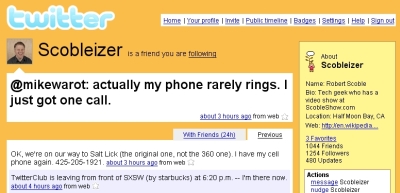 As I become more and more immersed in the world of social media, I begin seeing how it’s not just me; social media is a tool that infiltrates our existence and our being. Consider the Digg effect: if your server is ill-prepared for a traffic spike and you hit the front page for the first time, your web host will probably disable your service contract. Within the first few hours, you’re seeing at least 10,000 visitors to your website. That’s substantial. These thousands of users are all accessing your superior content at the same time and are being influenced by what you say. In fact, social media is on the radar of many prominent news outlets. Journalists are watching what is being submitted, and more interestingly, they are watching what you say.
As I become more and more immersed in the world of social media, I begin seeing how it’s not just me; social media is a tool that infiltrates our existence and our being. Consider the Digg effect: if your server is ill-prepared for a traffic spike and you hit the front page for the first time, your web host will probably disable your service contract. Within the first few hours, you’re seeing at least 10,000 visitors to your website. That’s substantial. These thousands of users are all accessing your superior content at the same time and are being influenced by what you say. In fact, social media is on the radar of many prominent news outlets. Journalists are watching what is being submitted, and more interestingly, they are watching what you say.
Two examples have arisen this past week.
In anticipation for the highly acclaimed Harry Potter novel, photographed pages of the book have already leaked onto the Internet. Within hours, the discovery was brought to the forefront of the Digg community. The Wall Street Journal covered the initial leak. What tipped them off? This TorrentFreak post seems most likely. After all, it made its way to Digg.
In the Wall Street Journal article, they quoted the response of the Digg community:
“Great, cant digg now for the rest of the week…for fear of spoilers,” a poster called “listor” wrote on Digg. On the same site, another, calling himself v1ct0r, said whoever put the book online deserves harsh punishment: “He will be sent to Azkaban, if he get arrested.”
I guess it is much easier to get a quote online than to call someone or email someone for something on the record. This, to journalists, is on the record as far as they’re concerned.
I thought that would be a standalone event, and then I saw a follow-up on the story, indicating that the EXIF metadata on the photograph might provide leads to the owner of the camera from which the photographs of the book were released.
A post on the digg.com website claimed that the serial number of the camera which photographed the pages claimed to be from the unpublished Harry Potter, was 560151117.
And so, social media penetrates into mainstream media. Can someone tell me that they didn’t see this happening? Can someone say that social media has no value to anyone? Do you really believe that?
It’s not only Digg, though.
A few months ago, when Google Maps came out with its Street View photo functionality, a woman in California complained to the popular Boing Boing blog that her cat was photographed. She was very concerned about Google’s violations of privacy.
Two days later, her story hit the New York Times. (So much for privacy, right?)
Have we entered an era where social media has made a strong impact on mainstream media? I think we have, more so than when I blogged about it before. Popular news aggregation services and blogs are now part of a journalist’s checklist of sources.
It’s obvious that I’ve been embracing social media and have no immediate plans to stop. It wasn’t long ago that I volunteered my reasons why I chose to go that route:
Question: Do you read the Sunday paper? My answer: No. I read Digg. Stuff gets there faster.
It’s very true. The writers are getting their news from us. 🙂
Where do you stand on this obvious impact of social media?





I blogged, with some emotion, against Google because of the news reporting hoopla generated about that woman who felt her privacy was violated and was shot down fast as a paranoid, uninformed human of little value to this planet.
So now, in addition to not reading STAR, US Weekly, and all the other so called journalist-based options available to me about so called stories with “facts”, I now count social media as another source for fantasy land.
“News” comes from countless sources and avenues, with blogs being a new resource. Social Media is not the new age of unbiased, objective reporting and worse, what is now considered a “story” would never have seen the light of day in a traditional print newspaper or news magazine.
Good points, Kim.
I think that bias is becoming more and more part of traditional marketing — essentially, we’re seeing an evolution of traditional marketing because of the influence of social media. It may be fantasy, but it’s also very real to so many people.
At the same time, it’s interesting to see what stories get promoted to the front page: that’s what these democratic sites think of as news. I think journalists are taking the hint. They are responding to our stories with their own, which brings us to these sites. This is an extremely powerful thing.
I don’t think that this evolution is going to be changing anytime soon. I think that more newspapers and magazines will be more influenced by social media as time goes by. “Traditional” print newspapers, as we know them, are no longer.
Yup.
A few thoughts that I’ve had since I started digging in 2005.
A Columbia Journalism Review article I wrote about it: Digg This and on my personal blog Social News Sites — an Act of Journalism?.
Fact is – social news sites aren’t going away — and they change the manner in which information is exchanged online — it speeds the process up just that much more. Journalists are already dragging their legs trying to catch up.
Journalists using social media for story tips and ideas is nothing new. It’s just now becoming common enough that they’re admitting their sources.
Very true, Lee. Now they don’t have to be ashamed. 🙂
I have trouble understanding how the dumbing down of Journalism is a good thing. Reminds me of the movie, Idiocracy (http://en.wikipedia.org/wiki/Idiocracy), where stupid people bred even more stupid people and finally humans were unable to sustain themselves.
Straight news reporting journalism used to be forbidden to include opinion. If the rules are changing, how can we sift through fact from fantasy?
My Journalism professor told me one day that I had to make a choice between “creative” writing and true journalism. The two could never be married. I rebelled and did things my way anyway. I wonder what they teach in colleges today?
Kim: The time has come where your journalism professor is left with little choice.
Readers are turning to blogs and social media sites because they are faster than traditional outlets.
There is an increasing dependence on blogs and not so much on traditional news sites. I think that journalists took note of that. They are also heavily swayed by what the community votes on as a high-profile story, and in their writings, they’ll put more emphasis on these stories.
The fact vs. fiction challenge is an interesting one, however. I think that this very fact still distinguishes traditional journalists from bloggers, whereas traditional journalists are still obligated to perform due diligence. Bloggers are not bound by the same ethics.
Well let me add by saying I recently opened up a copy of Entertainment Week(ly?) for the first time in a long while and there was a two page spread on “celebrity blogs”.
A recent picture of the explosion that happened in NYC struck me because it contained a line of witnesses all taking photographs of the event with their cellphones… which I’m sure some of those photographs made their way to social media sites.
It is to the point where I read folks suggesting that one solution to newspaper’s woes is to turn into local blog networks.
So yeah, social media has totally impacted the mainstream. Whether or not the idea of quality and truthful journalistic values can be maintained is another issue…
Can’t be true journalism, at least the kind I like, where there are trained reporters getting facts, not rumor and hype. What SM does is pack in a marketing element to stories, because of course, we love to be entertained and intellectually, mainstream interests fall into the Paris Hilton realm.
It’s just not journalism to me. Voyerism, yes. Not journalism.
Tamar, this post could have been about Johhny Carson, David Lettermen, or Jay Leno.
You know, the places where most people got their “news”.
Later this post could have been about The Daily Show, or The Colbert report. You know, the places where most people got their “news”.
Now it is about Digg and blogs and social. You know the places where most people get their “news”.